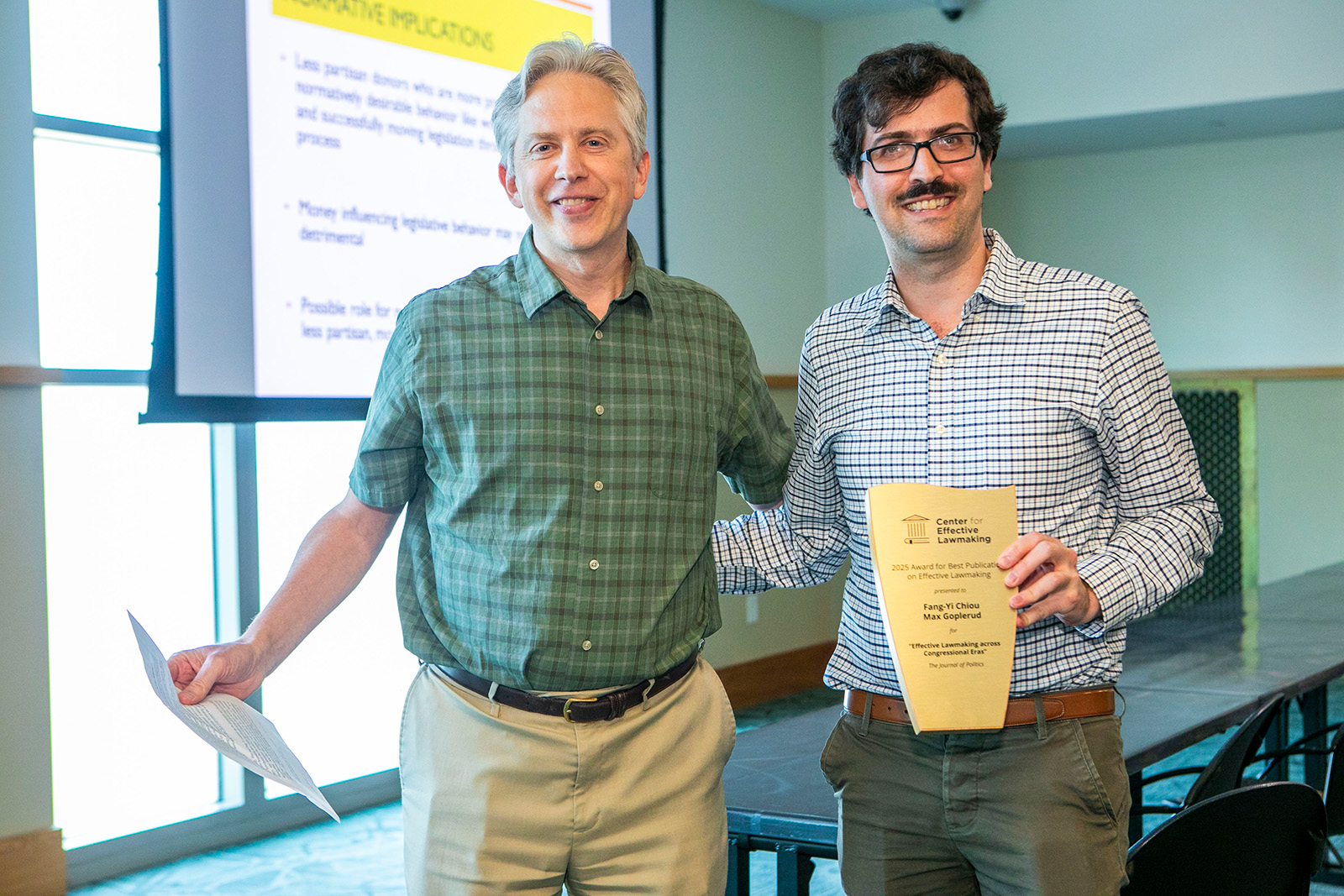Max Goplerud (R) being presented with the CEL’s Best Publication award by co-director Craig Volden (L) (Photo by Anne Rayner).
Recognizing Innovation in Legislative Research: 2025 Best Publication on Effective Lawmaking Award
The Center for Effective Lawmaking is pleased to announce the recipients of the 2025 Award for Best Publication on Effective Lawmaking, which was presented at our Seventh Annual Research Conference held at Vanderbilt University on Monday, June 2, 2025. This year’s award honors Fang-Yi Chiou (Academia Sinica) and Max Goplerud (University of Texas–Austin) for their article, “Effective Lawmaking Across Congressional Eras,” published in The Journal of Politics in 2024.
Chiou and Goplerud’s groundbreaking paper introduces a novel measure of a lawmaker’s legislative effectiveness—defined as their ability to introduce and advance significant policy proposals—by examining patterns across Congress from 1873 to 2010. They develop a concept of “extended legislative effectiveness” to overcome the limitations of conventional metrics, which are often incomplete or unavailable prior to 1973. By constructing new member-level and bill-level scores, the authors shed light on how legislative outcomes historically reflected the influence of certain lawmakers, and how the relationship between lawmaking and congressional organization has evolved over time.
One of the paper’s most striking contributions is its identification of distinct historical “regimes” of effectiveness. The authors find that from the 1890s to the mid-1940s, ideological moderation was a key predictor of legislative success, whereas majority party advantage played a more limited role. However, after 1947, majority party membership became a clear advantage, and the impact of ideological extremism diminished—particularly from the mid-1970s onward, when partisan dynamics and committee leadership became more influential. They also find that committee chairs consistently enjoy higher levels of lawmaking effectiveness, with especially strong effects during the era of the “Textbook Congress” in the House.
In addition to offering new theoretical insights, the article provides valuable resources for future research. The authors share newly developed datasets that assign notability scores to individual bills and effectiveness scores to lawmakers, offering a valuable toolset for scholars across numerous subfields of American politics, including studies of the presidency, bureaucratic policymaking, and American political institutional development. Their methodological approach also invites future scholarship across comparative political regimes and governing institutions.
This award-winning research exemplifies the Center for Effective Lawmaking’s mission to support rigorous, data-driven scholarship that deepens our understanding of how legislators succeed in advancing meaningful policy. “This pathbreaking work by Chiou and Goplerud will open up avenues through which scholars can engage with fundamental questions about the evolution of institutional design in the American Congress, over nearly 150 years, and its consequences for lawmaking effectiveness. I am hopeful that this project will lead to new and important contributions by scholars who are drawn to these questions,” stated CEL Co-Director Alan Wiseman. By expanding the historical scope of legislative effectiveness and offering new empirical tools, Chiou and Goplerud’s work opens up new avenues for exploring the institutional and individual dynamics that shape lawmaking over time.
In presenting the award and commendation to Chiou and Goplerud, CEL Co-Director Craig Volden commented, “This article offers both a methodological breakthrough, allowing researchers to measure effective lawmaking over additional years and settings, and a substantive contribution in establishing how institutional reforms affect the power centers of legislative effectiveness.” We congratulate the authors for their outstanding contribution and look forward to seeing how their research continues to influence the field.
The full commendation can be found here.

Fang-Yi Chiou, Academia Sinica
Dr. Chiou is a Professor at the Institute of Political Science at Academia Sinica. He received his Ph.D. from Princeton University in 2005, and he joined Academia Sinica at the end of 2005. His primary areas of research focus on theoretical and empirical studies of the U.S. Congress and Taiwanese legislature. He has published numerous works on topics including the causes of legislative productivity and gridlock, the interplay between party discipline and the effects of filibustering, and the determinants of institutional design in political settings.

Max Goplerud, University of Texas-Austin
Max Goplerud is an assistant professor in the Department of Government at the University of Texas at Austin. He received his Ph.D. from Harvard University in 2020. His current research interests focus on developing methods, drawing on the tools of Bayesian methods and machine learning, to facilitate new approaches for empirically engaging with data that is commonly employed in political analysis. He is also engaging with text-as-data empirical approaches to study comparative legislative behavior in the United States, the European Union, and Japan.



